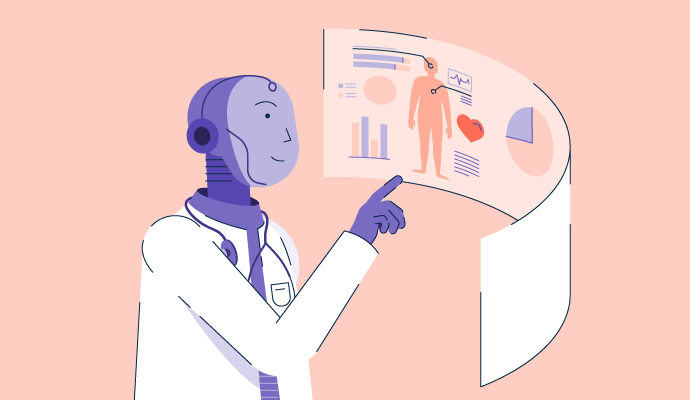December 4, 2023
 by Soundarya Jayaraman / December 4, 2023
by Soundarya Jayaraman / December 4, 2023

You go to the hospital for a routine checkup. When you enter the doctor's office, reception quickly looks up your electronic health records (EHR) in an app. It includes your latest test results and possible diagnoses.
As the doctor examines you, they record their observations and findings into the app with their voice instructions. Once the visit ends, the doctor reviews the AI-generated notes, edits them, and updates your EHR.
This is just one emerging application of artificial intelligence (AI) in healthcare. It is revolutionizing the healthcare landscape, from powering healthcare analytics tools and EHR software to helping with drug discovery.
AI has a variety of applications in the healthcare industry, including:
To understand better, we got the help of healthcare AI experts around the world. Here’s what they had to say about its current state, future prospects, and challenges.
It’s no doubt, generative AI tools like ChatGPT and Midjourney have caught the imagination of common people. But just like the tools changing everyday lives, AI is silently making inroads into the healthcare ecosystem, the industry that literally saves lives. Experts note that while healthcare AI is still in the early stages of adoption, they see a growing interest and investment in this area.
“There is a lot of genuine curiosity now around AI adoption in healthcare compared to a couple of years back. I believe it is because, like any other new technology, as awareness grows, so does acceptance, with a healthy dose of cautious optimism.”
Neema Jayadas
Head of Operations, Aarogya.ai
An unprecedented surge in volume, velocity, and variety of data, cheaper computer hardware, and substantial advancements in AI, ML, and large language models (LLMs), have unleashed a wave of innovation in the healthcare industry.
“Applying AI in healthcare in the era of big data enables complex patterns and relationships within the data to be discovered algorithmically, which can provide substantial improvement in all areas of healthcare, from diagnostics to treatment,” said Ezinne V.C Onwuekwe, Senior Analyst, at Nova Scotia Health
Consequently, there’s also a surge in funding for healthcare AI from venture capital firms and tech companies, alongside healthcare professionals exploring the advantages of its applications. The AI healthcare market is forecasted to grow to $187.95 billion by 2030. That’s a compound annual growth rate (CAGR) of whooping 37% from 2022!
According to a recent study by Bain, almost 6% of healthcare leaders have a generative artificial intelligence (AI) strategy today. About 50% are actively developing one or are planning to in the near future.
of healthcare industry software buyers say it’s important or very important that the software they buy moving forward has AI functionality.
Jayadas highlighted that several governments engage with AI healthcare companies because they see the real value it can bring.
“The use cases and the impact of AI can no longer be ignored by wary critics,” noted Jayadas.
AI encompasses many technologies. Let’s start going over the specific set of AI technologies that are of relevance to the healthcare industry.
|
AI technology |
Purpose |
|
Machine learning, deep learning, and neural networks |
Algorithms that learn from large datasets and make predictions used in diagnostics, treatment planning, and patient risk assessment |
|
Allows machines to understand and process human language, used in extracting information from medical records and patient interactions |
|
|
Enables machines to interpret and analyze visual data used in medical imaging interpretation and radiology. |
|
|
Automates repetitive tasks, like administrative work and data entry to boost operational efficiency |
|
|
Robots |
Assists with surgical procedures, clinical settings, and logistics within medical facilities. |
The circumstances that Jayadas pointed out are just the beginning. Following are some exciting areas where healthcare workers are experimenting and adopting AI.
Diagnostics is one of the most promising applications of healthcare AI. CT and ultrasound examinations have doubled in the last decade,giving experts evidence that AI-powered medical imaging tools ease the burden of medical professionals while improving the accuracy of diagnosis. Because radiology, pathology, dermatology, and ophthalmology depend on pattern recognition, these fields specifically benefit from computer vision, image recognition, and ML.
“AI-based image analysis systems can help radiologists detect abnormalities, prioritize cases, and improve diagnostic accuracy. For example, AI algorithms have shown success in detecting early signs of diseases like breast cancer.”
Ezinne V.C Onwuekwe
Senior Analyst, Nova Scotia Health
To give a real-life use case of this, take Google’s healthcare AI project. It has developed advanced AI algorithms that analyze medical images like X-rays and CT scans to detect lung cancer, heart problems, and skin diseases. Its AI-powered app, DermAssist, released in 2021, helps self-diagnose a person’s skin concerns with just a few questions and three quick photos.
Source: Google
Today, DermAssist is integrated with Google Lens, Google’s image search feature, so you don’t even need a separate app to learn about your skin conditions. Just click a picture via Google Lens and get the information you need. While the app is just for informational purposes and doesn’t provide diagnoses like a doctor, think about the potential these applications will have in the future.
To put this in numbers, it’s estimated that using AI in diagnostics can improve patient outcomes by 30% to 40% and reduce treatment costs by up to 50%.
Developing a new drug typically spans many years, from identifying prospective candidates to getting regulatory approval. Not to mention the multiple, near-relentless challenges companies face before licensing. Discovering drug molecules that’s better than current ones, unexpected failures during trials, and ever-increasing regulatory hurdles for governmental authorization lead to setback after setback.
It costs $1 billion to develop and bring just a single drug to the market, and the research and development cost could be as high as $2.5 billion. And still, 9 out of 10 drugs fail safety and effectiveness tests. AI offers to change this and provide a way out.
Onwuekwe indicated that AI expedites the drug discovery and development process. “ML algorithms can assist in optimizing drug combinations and have already shown promise in developing new treatments for diseases like cancer, Alzheimer's, and rare genetic disorders,” she said.
Advanced ML algorithms, with deep learning techniques, can sift through vast databases of chemical compounds to hit on probable drug candidates in a fraction of the time and cost of traditional methods. It can help with design drugs, assess safety profiles, and predict how a compound will interact with certain proteins and receptors.
Dr. Chetan Kaher, Chief Innovation Officer at Jiva.ai, cited the example of DeepChem, an open-source platform that employs deep learning to anticipate the interactions between drug molecules and biological structures.
Even modest improvements in early drug development stages using AI could cut pre-clinical development costs by 20 to 40%, according to Morgan Stanley Research analysts Matthew Harrison and Vikram Purohit. And many pharmaceuticals are already trying to reap the benefits.
Insilico Medicine, a drug discovery company, started phase 2 of its clinical trial for medication developed to treat a rare respiratory disorder using generative AI just two and a half years after the project started. To put this in perspective, using traditional methods would have cost the company $400 million and up to six years to reach the same stage.
As part of the drug development process, clinical research involves a series of trials in several human subjects to assess the safety and effectiveness of a drug. This area shows that capabilities of AI and ML technologies are coming to the forefront. From designing the trial to data collection and analysis, AI advances clinical research.
The U.S. Food and Drug Administration (FDA) saw over 100 submissions of drug and biologic applications that use AI/ML components in 2021 alone. They cover various aspects of drug development, including drug discovery, clinical research, and postmarket safety surveillance.
Physicians spend an average of 15.5 hours per week on paperwork and administration. They are required to complete dozens of patient forms, post-visit notes, employee shift notes, and other administrative tasks. In fact, they work 10 hours overtime on average to keep the red tape under control. It consumes time, money, and emotional energy.
of doctors have said their administrative workload is an impediment to caring for their patients.
Source: Canadian Medical Association
Patients, too, face the administrative hassles of figuring out which forms to complete, which in-network doctors to visit, and which treatments to worry about under their insurance – not to mention arguments with loved ones about bills and coverage.
To deliver reduced administrative burdens for themselves and simplify experiences and outcomes for their patients, healthcare staff need modern software that embraces AI, said Dominic Duda, Senior Research Analyst for Healthcare at G2.
For instance, he noted how AI can reduce human errors and optimize workflows for claims management and medical billing segment It relieves clinician burnout typically associated with administrative tasks.
Did you know that the manual authorization process can take up to 16 hours? Companies like Anthem, United Healthcare’s Optum, and Florida Blue are using AI to speed things up for everybody.
In another real-life example, the Mayo Clinic reduced doctor overtime by 10% and increased surgical space utilization by nearly 20% by turning to AI software to schedule procedures more efficiently.
Unlike AI applications in drug development, clinical research, and therapies, use cases like these don’t need prior approval from any regulatory agencies. The AI functionality integrates into existing EHR software, clinical documentation tools, claims management, or medical billing platforms using application programming interfaces (APIs).
Beyond administrative applications, the power of AI wields the most force when it comes to patient engagement, the truly important and difficult part of delivering quality care.
“AI helps engage with patients at the right time through the right channel.”
Dominic Duda
G2 Senior Research Analyst for Healthcare, G2
In particular, conversational AI chatbots and virtual assistants are emerging as integral parts of patient interaction. These virtual assistants provide round-the-clock support by helping with triage cases, patient queries, and appointment scheduling. They offer medication reminders and provide basic medical advice, said Onwuekwe.
For instance, K Health, a conversational AI chatbot, gets patients’ data via questions and advises next steps. It also gives options to connect with a clinician or nurse during the live chat. After the patient speaks with a person, the AI chatbot summarizes their input and suggests potential diagnoses. To date, more than 3 million people have had a chat with a doctor or a nurse via K Health’s platform.
Source: K Health
Many more healthcare providers want to add generative AI tools that converse in natural language to enhance their patient experience. For instance, India’s largest hospital company, Apollo, has partnered with Google to offer telemedicine and AI-powered online doctor consultations. Apollo plans to use Google’s more advanced Med-Pathways Language Model (PaLM) 2, an LLM trained on medical knowledge for this purpose.
Onwuekwe noted that AI tools can also personalize treatment plans by analyzing individual patient data, including genetic information, medical history, and lifestyle factors. The systems easily manage data points from health monitoring devices and wearables to get improved insights for better data-driven treatment decisions.
“ML algorithms can predict patient outcomes, recommend tailored therapies, and identify high risk individuals for certain diseases. Companies like Tempus and Flatiron Health are using AI to analyze data for personalized cancer care.”
Ezinne V.C Onwuekwe
PMP Senior Analyst, Nova Scotia Health Member
AI systems also nudge patients to follow the plan for better outcomes. They might send out automated reminders to take medicine, schedule yearly exams or vaccinations, or share relevant educational resources after a patient visit. Seemingly small gestures, but automated patient communication drastically upgrades patient experience.
Related: Learn how healthcare business intelligence improves patient care.
Like any new technology adoption, healthcare AI encounters a number of challenges before companies use it more widely. Below are some roadblocks to implementing AI, according to experts.
Onwuekwe and Dr. Kaher pointed out data quality and accessibility issues that afflict the healthcare industry. Healthcare data is often unstructured and fragmented across multiple systems, even within the same organization. Dirty data, the lack of data standardization, and interoperability between different tools storing data add to the problem. This makes it difficult for healthcare companies to use advanced data analytics and AI.
Even if data quality and accessibility issues are addressed, the unknown and inherent bias in the data used by AI could also lead to unfair or discriminatory outcomes.
To combat this challenge, healthcare providers must collaborate more with technology providers to eliminate silos for easier, private data sharing and aggregation.
Healthcare deals with the most sensitive datasets – patient health records. Nowadays, private companies own and control most healthcare AI technologies. This adds privacy and security challenges related to control issues surrounding patient data. Different states have their own, individual regulations, and any breaches or failure to maintain integrity can have legal and financial penalties.
Healthcare companies and AI providers can fight this problem by implementing comprehensive data protection measures and adhering to data privacy regulations like Health Insurance Portability and Accountability Act (HIPAA), noted Dr. Kehar.
In addition, companies should employ strong encryption and access controls, and establish transparent data governance frameworks to strengthen the security posture.
Healthcare is one of the most heavily regulated industries in the world. ButAI adoption is in its infancy, which means its regulation is also a baby.
It has a variety of use cases, like chatbot healthcare services and AI-powered medical devices. Developing standards is tough for both governments and AI developers. As a result, companies have to grapple with a dynamic regulatory environment while complying with extant healthcare, privacy, and security laws.
To make this a bit easier, Onwuekwe explained that close collaboration between healthcare regulators and AI developers will create flexible regulations. This is important for fostering innovation and ensuring patient safety, data privacy, and the ethical use of AI.
“Most pressing challenge with any new technology is mindset - equipping ourselves to be open to understanding it and mitigating risks.”
Neema Jayadas
Head of Operations, Aarogya.ai
"At a grassroots level, I have observed often there is intent and interest to adopt newer technologies that’ll bear huge returns in both impact and investment," Jayadas said. "But they are often limited by the existing technical framework."
Further, she told us that strengthening the healthcare framework – even in the most remote areas – was the best way to move healthcare AI forward. “It lays the foundation for (healthcare professionals) to be able to implement and adopt newer technologies more quickly and effectively; this can have a ripple effect in how they function, which will drive much better clinical outcomes as well,” Jayadas added.
Onwuekwe suggested involving everyone in the development and validation process to foster acceptance and trust in AI systems.
Resource constraint is another major challenge to AI adoption. This includes limitations to the funding, expertise, and infrastructure required to implement and maintain AI solutions effectively.
Despite the challenges, experts are upbeat about AI’s prospects in healthcare.
Dr. Kaher thinks that the most exciting developments of AI in the future will include combining different AI techniques, automation, and multimodal AI.
“Imagine a world in which we use machine vision to spot cancers from CT scans and then use generative AI/NLP techniques to automatically write the report, with an automaton to the radiologist that the finding is ready to be reviewed, and a further automated messaging service to get the appointment with the patient booked.”
Such a system can make healthcare more personalized, patient-centric, efficient, and affordable.
Jayadas highlighted how AI could aid with proactive drug and vaccine development in the future.
“We can now marry genomics with cutting-edge AI to predict and find novel mutations, which in turn would aid drug and vaccine development proactively versus reactively, as is the case right now.”
Neema Jayadas
Head of Operations, Aarogya.ai
Duda predicts that healthcare organizations that make smart investments in AI-powered solutions will see improved ROI in 2024. “These AI investments should be focused primarily on medical practice management, medical billing, and patient engagement solutions, as they encompass key business functions for clinical and administrative staff,” he said.
AI is changing the healthcare game with its ability to improve patient care and reduce costs. Healthcare companies will certainly face obstacles on their journey to adopt AI. But the transition is not a question of if, but when – and the answer is now.
Learn more about healthcare revenue cycle management and how it maximizes the financial success of healthcare organizations.
Soundarya Jayaraman is a Senior SEO Content Specialist at G2, bringing 4 years of B2B SaaS expertise to help buyers make informed software decisions. Specializing in AI technologies and enterprise software solutions, her work includes comprehensive product reviews, competitive analyses, and industry trends. Outside of work, you'll find her painting or reading.
Healthcare specialists have always felt that the lack of proper technology is a major...
 by Sumayya Mahin
by Sumayya Mahin
Can data save lives? It can, and it is saving lives. If you are wondering how healthcare data...
 by Ilan Hertz
by Ilan Hertz
It’s no secret that healthcare is a perpetually in-demand field.
 by Rebecca Reynoso
by Rebecca Reynoso
Healthcare specialists have always felt that the lack of proper technology is a major...
 by Sumayya Mahin
by Sumayya Mahin
Can data save lives? It can, and it is saving lives. If you are wondering how healthcare data...
 by Ilan Hertz
by Ilan Hertz


